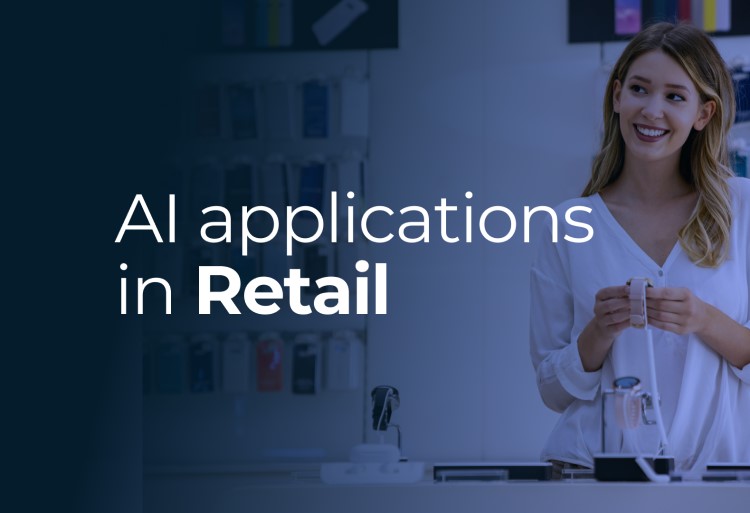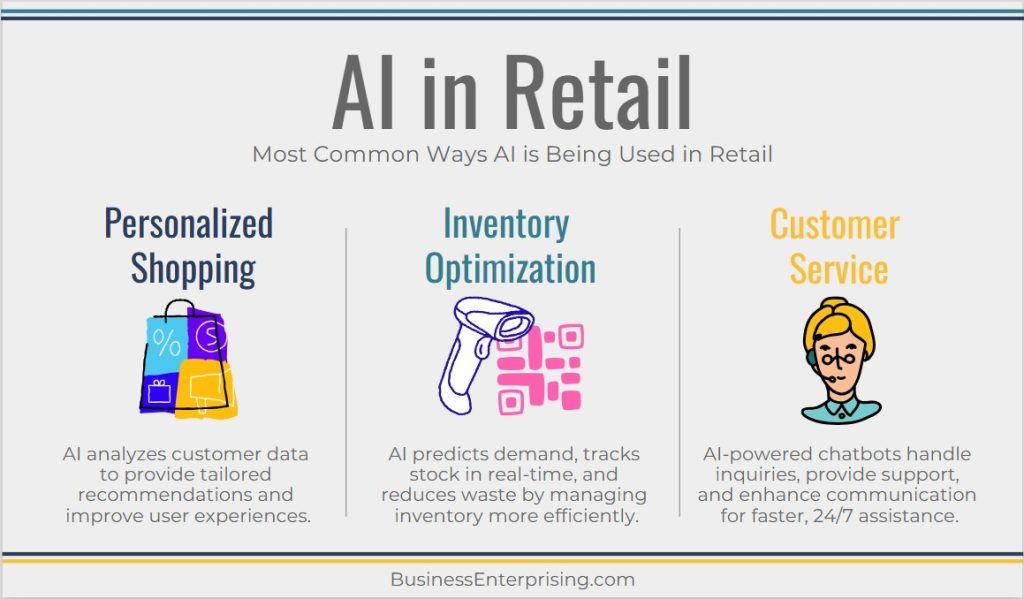 AI applications in retail are transforming how businesses operate and interact with customers. By leveraging AI, you can improve efficiency and deliver personalized experiences. Additionally, these tools analyze data in real-time, allowing you to adapt quickly to market trends and customer needs.
AI applications in retail are transforming how businesses operate and interact with customers. By leveraging AI, you can improve efficiency and deliver personalized experiences. Additionally, these tools analyze data in real-time, allowing you to adapt quickly to market trends and customer needs.
However, implementing AI effectively requires a thoughtful approach that aligns with your business goals. From optimizing inventory to enhancing pricing strategies, AI offers solutions to common retail challenges. Therefore, exploring these technologies can give your business a competitive edge.
As customer expectations evolve, adopting AI can help you stay ahead and meet those demands. These applications provide innovative ways to improve operations and create more engaging shopping experiences.
Personalized Shopping Experiences with AI
AI applications in retail are transforming how businesses create personalized shopping experiences. By analyzing customer data, AI identifies preferences, behaviors, and purchase patterns. This allows retailers to deliver tailored recommendations that resonate with individual shoppers. As a result, you can create a more engaging and satisfying experience for your customers.
Additionally, AI adapts in real-time to changing customer preferences. For example, recommendation engines can adjust suggestions based on browsing history or recent purchases. Therefore, your customers feel understood, which strengthens loyalty and encourages repeat business. These capabilities help you provide value while staying competitive in a crowded market.
However, personalization requires a balance between relevance and privacy. AI-driven insights should be used responsibly to build trust and avoid overwhelming customers. When implemented thoughtfully, AI applications in retail can create seamless, tailored experiences that meet customer expectations and improve satisfaction. By leveraging these tools, you can enhance engagement and boost your business outcomes.
AI-Powered Inventory Management
AI-powered inventory management is revolutionizing how retailers maintain stock levels and meet customer demand. By using advanced algorithms, AI analyzes sales data, seasonal trends, and market conditions to predict demand accurately. This allows you to stock the right products at the right time, minimizing shortages and overstock situations.
Additionally, real-time tracking gives you greater visibility into your inventory across multiple locations. AI can identify slow-moving products and suggest adjustments to prevent waste. Therefore, you can reduce unnecessary expenses while keeping your operations efficient. These tools make it easier to adapt to changing customer preferences and market conditions.
However, implementing AI in inventory management requires consistent data input and monitoring. By integrating these systems effectively, you can optimize stock levels, enhance forecasting accuracy, and improve overall supply chain efficiency. AI applications in retail, like inventory management, help businesses stay agile and meet customer expectations in an increasingly competitive landscape.
Customer Service and Chatbots
AI in customer service is transforming how businesses interact with their customers. AI-driven chatbots provide 24/7 support, handling queries efficiently and reducing response times. These chatbots offer instant answers to common questions, freeing up your team to focus on more complex issues. As a result, you improve both efficiency and customer satisfaction.
Additionally, chatbots use natural language processing to create a conversational experience that feels personalized and human. They can assist customers with order tracking, product recommendations, and troubleshooting. Therefore, your customers receive timely support, enhancing their overall experience. AI applications in retail highlight how this technology helps businesses meet rising customer expectations.
However, successful chatbot implementation requires thoughtful design and ongoing updates. AI should complement, not replace, your human support team. By integrating chatbots strategically, you improve service availability while maintaining a personal touch. These AI tools make it easier to deliver consistent, high-quality support and strengthen your relationships with customers.
Enhancing Pricing Strategies with AI
AI is reshaping pricing strategies by enabling retailers to make data-driven decisions that maximize profitability and customer satisfaction. By analyzing market trends, AI identifies shifts in demand and emerging patterns. This allows you to adjust prices dynamically and remain competitive in real time.
Additionally, AI examines competitor pricing to help you position your products effectively. It can recommend pricing strategies that balance profitability with market demands. Therefore, you can avoid underpricing or overpricing, both of which impact customer perception and sales. AI applications in retail showcase how these tools empower smarter pricing decisions.
AI also considers customer behavior, such as purchase history and browsing habits, to personalize pricing. By tailoring discounts or offers, you can improve customer loyalty and encourage repeat purchases. However, effective implementation requires regular monitoring and integration with your broader strategy. Using AI for pricing helps you adapt quickly and stay ahead in a competitive market.
Fraud Detection and Prevention in Retail
AI is transforming fraud detection and prevention in retail by providing advanced tools to identify and stop suspicious activities. By analyzing transaction patterns, AI detects anomalies that may indicate fraud. These systems can flag unusual behaviors, such as repeated failed login attempts or inconsistent purchasing habits, for further review.
Additionally, AI continuously monitors transactions in real-time, which helps you act quickly to address potential threats. Machine learning algorithms adapt to new tactics, making it harder for fraudsters to bypass detection. Therefore, you gain a proactive approach to protecting your business and customers from financial losses.
AI applications in retail also support verification processes to ensure secure customer interactions. For example, these systems can authenticate identities or validate payment methods during transactions. However, the effectiveness of AI requires regular updates and integration with your overall security strategy. By using AI for fraud prevention, you strengthen trust and reduce risks in your retail operations.
AI-Powered Visual Search and Augmented Reality
AI-powered visual search and augmented reality are transforming the way customers shop by offering engaging and interactive experiences. Visual search enables users to upload images and find similar products instantly. By analyzing visual data, AI matches patterns, colors, and styles to provide accurate and relevant results. Therefore, you can simplify the shopping process and enhance customer convenience.
Additionally, augmented reality allows customers to visualize products in real-world settings or try them on virtually. For instance, AR-powered virtual try-ons let users see how clothes, glasses, or makeup look before purchasing. These features reduce uncertainty and improve confidence in buying decisions. AI AI applications in retail highlight how these tools bring innovation to traditional shopping methods.
However, to maximize their impact, these technologies require seamless integration into your online platforms. By implementing AI-powered visual search and AR, you can create a personalized shopping journey that keeps customers engaged and satisfied. These tools offer a modern approach to meeting customer expectations while standing out in a competitive market.
Conclusion
AI applications in retail are redefining how businesses meet customer needs and stay competitive. From personalized experiences to fraud prevention, AI offers valuable tools to streamline operations and improve satisfaction. Additionally, technologies like visual search and augmented reality create unique and engaging shopping experiences that attract and retain customers.
However, adopting AI requires careful planning and integration to maximize its benefits. By leveraging these technologies effectively, you can address challenges while positioning your business for future growth. AI provides practical solutions to enhance efficiency, increase customer loyalty, and drive innovation in retail.



